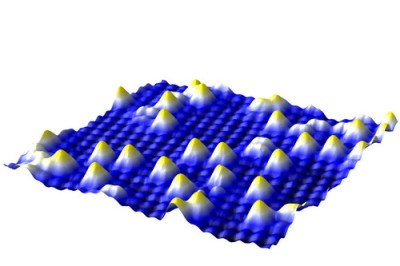A group of surface scientists from the Vienna University of Technology has devised a technique to place single gold atoms on specific sites of the surface of iron oxide, paving the way to develop high-efficiency catalysts using minimum amount of precious metals.

STM Image of the iron-oxide surface with gold atoms on top.
A gold particle’s catalytic activity relies on its size and some evidence proposes that single gold atoms have much higher catalytic activity. However, gold atoms have a tendency to form small nuggets comprising multiple atoms when they put on a surface. The TU Vienna research team has successfully tackled this issue through the discovery of a new type of iron-oxide surface that can fix the single gold atoms in position.
The key is the iron-oxide crystal structure’s mild deformation. The uppermost layer’s oxygen atoms form wiggle lines due to the underneath atoms. Gold atoms demonstrate permanent attachment at the points where the oxygen atoms are closely located. They have remained in position even after heating the surface. They have started creating clusters only at temperatures of 500°C.
Gareth Parkinson, who supervised the work done by the team of Professor Ulrike Diebold from the Institute for Applied Physics at the TU Vienna, informed that when a gold atom gets contacted the iron oxide surface, it diffuses into one of the spots where it can be affixed with the surface, thus enabling the atoms to be positioned close to one another. When a gold atom contacts a site that is attached to another gold atom, the two atoms start traveling across the surface and gathering additional atoms all along the way to form gold nuggets.
Diebold stated that the team has developed an ideal model system for studying single atomic species’ chemical reactivity. This special surface and the quantum mechanically complex bonding between individual atoms are helpful in performing theoretical calculations of highly correlated electron systems.
Disclaimer: The views expressed here are those of the author expressed in their private capacity and do not necessarily represent the views of AZoM.com Limited T/A AZoNetwork the owner and operator of this website. This disclaimer forms part of the Terms and conditions of use of this website.